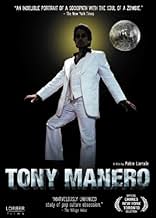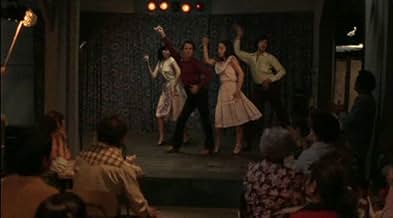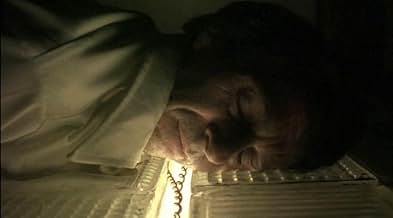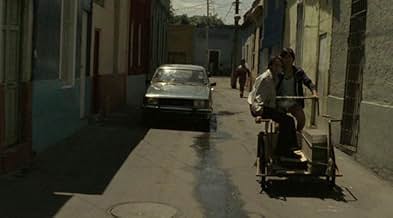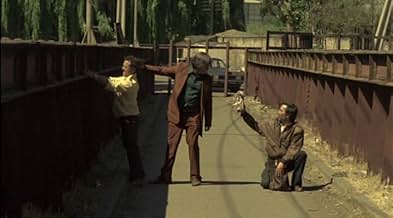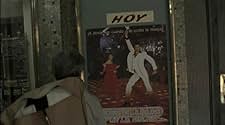VALUTAZIONE IMDb
6,8/10
4666
LA TUA VALUTAZIONE
Un uomo è ossessionato dall'iconico personaggio fittizio e ballerino re della discoteca Tony Manero del film "La Febbre del Sabato Sera" (1977).Un uomo è ossessionato dall'iconico personaggio fittizio e ballerino re della discoteca Tony Manero del film "La Febbre del Sabato Sera" (1977).Un uomo è ossessionato dall'iconico personaggio fittizio e ballerino re della discoteca Tony Manero del film "La Febbre del Sabato Sera" (1977).
- Regia
- Sceneggiatura
- Star
- Premi
- 19 vittorie e 16 candidature totali
Recensioni in evidenza
Ive been meaning to review this film for years as it has stayed with me from when I first sewed it many years ago.
I think this is a terrifying masterpiece, its underrated, under discussed, and shows the true horror of serial killers instead of the glamorous side of in such films such as Silence of the Lambs or the Tv series Mindhunter.
The connection of the Saturday Night Fever character to a serial is sheer perfection, its bizarre yet truly haunting.
I think this is a terrifying masterpiece, its underrated, under discussed, and shows the true horror of serial killers instead of the glamorous side of in such films such as Silence of the Lambs or the Tv series Mindhunter.
The connection of the Saturday Night Fever character to a serial is sheer perfection, its bizarre yet truly haunting.
It is a very interesting Chilean film; it has a strange plot and the acting is good; it is a very bizarre experience.
TONY MANERO (dir. Pablo Larraín) The film is set in Chile during the fascist reign of Augusto Pinochet, and focuses on a man who is obsessed with John Travolta's discotheque super-star character in Saturday NIGHT FEVER. This might have been played for laughs, but Pablo Larrain's film is an evil fantasy of disco glory that portrays an obsessive and twisted character who is willing to kill to to fulfill his grotesque vision of acclaim. The frenzied violence in this film is so sudden and inexplicable that it literally takes your breath away. The film seems to present a subtle metaphor that compares the highly stylized nature of disco to the uncompromising fascist posturing of totalitarianism. ABSOLUTE MUST SEE
The film, which conveys impressions from a country that is politically and economically collapsed, shows us how martial law situations actually get people out of control psychologically and sociologically rather than creating a control mechanism. You are increasingly watching your character's obsessions about the role model of a psychopathic character and their relationship with other people.
Edging to the annual awards season, this year a sure thing is that Chilean director Pablo Larrín will on everybody's radar with his one-two punch NERUDA (Chile's entry for the Best Foreign Language Film) and the formidable JACKIE, a biopic about Jacqueline Kennedy, may win its star Natalie Portman a second Oscar statue as a major player.
So here comes a warm-up to get acquainted with Larrín's previous work, TONY MANERO is his second feature, a sombre take on Chile's darkest time under the Pinochet regime peppered by a less sombre through-line: the 52-year-old protagonist Raúl Peralta's (Castro, Larrín's regular, an Al Pacino doppelgänger both in appearance and affective intensity, also the co-writer of the script) obdurate participation of a TV program "One O'Clock Festival", where a Tony Manero (the lead character in John Badham's Saturday NIGHT FEVER 1977, played by John Travolta) impersonation competition is scheduled in Santiago, 1978.
Examined closely by a hand-held Super 16mm, which intermittently toys with a blurry focus to accentuate the proximity of a sordid milieu, Raúl gives us the first impression of a pallid, taciturn, hangdog loner in the opening scenes where he mistakes the registration date as the actual contest, which will be held one week later. But that facet loses its disguise quickly, when he schematically assaults an old woman who has just been mugged on the street, at her own home, to take away her small boxy color TV set. He is not so much a petty criminal as a ruthless homicide, which ingeniously puts audience at the edge of the seat with a dreadful perturbation whenever he prowls or idles in the dilapidated environs, as violence could be erupted any moment if he sees the opportunity for a monetary gain, whoever the prey is.
Raúl lives with a coterie of amateur dancers in the scruffy house of Wilma (Poblete), where they also occasionally perform to entertain customers. His troupe includes Cony (Noguera), his friend- with-benefit, her adolescent daughter Pauli (Lattus) and Pauli's boyfriend Goyo (Morales). Together they help Raúl to rehearse the John Travola routine, but there is seething tension underneath, Raúl becomes impotent during an overtly explicit rumpy-pumpy, and is mocked by Cony that the only thing can revitalize him is the urge to win the competition, which sours their relationship, Goyo is involved with some surreptitious anti-Pinochet movement, which will put everyone under the interrogation of Pinochet's plainclothes secret police, although Raúl manages to skulk out since it is his big day.
Larrín's tack doesn't shy away from being obstinately provocative, up to an instance of sickeningly scatological malevolence, which seems like an unwarranted feeler to validate its sky's-the-limit artsy taste. But on the other hand, Larrín and his co-writers perspicuously cast a phenomenon of American culture invasion as an escapism for the amoral and the hard-up living under the terror of an autocracy, which indisputably hits the mark of liberating its restrained but astringent political manifesto.
Alfredo Castro is absolutely electrifying to watch from A to Z in the central role, holding Raúl's interior thoughts at bay, but excellently transforms himself onto the screen as a ravishingly volatile monster, with no fear, no conscience, no hold-up can stop his destructive/self-destructive wantonness (as the inauspicious ending dauntingly beckons), who should be answer for this type of societal mutator? The culprit is clear as day in this slam-bang critique of a bygone era weighing heavily on Larrín's fatherland.
So here comes a warm-up to get acquainted with Larrín's previous work, TONY MANERO is his second feature, a sombre take on Chile's darkest time under the Pinochet regime peppered by a less sombre through-line: the 52-year-old protagonist Raúl Peralta's (Castro, Larrín's regular, an Al Pacino doppelgänger both in appearance and affective intensity, also the co-writer of the script) obdurate participation of a TV program "One O'Clock Festival", where a Tony Manero (the lead character in John Badham's Saturday NIGHT FEVER 1977, played by John Travolta) impersonation competition is scheduled in Santiago, 1978.
Examined closely by a hand-held Super 16mm, which intermittently toys with a blurry focus to accentuate the proximity of a sordid milieu, Raúl gives us the first impression of a pallid, taciturn, hangdog loner in the opening scenes where he mistakes the registration date as the actual contest, which will be held one week later. But that facet loses its disguise quickly, when he schematically assaults an old woman who has just been mugged on the street, at her own home, to take away her small boxy color TV set. He is not so much a petty criminal as a ruthless homicide, which ingeniously puts audience at the edge of the seat with a dreadful perturbation whenever he prowls or idles in the dilapidated environs, as violence could be erupted any moment if he sees the opportunity for a monetary gain, whoever the prey is.
Raúl lives with a coterie of amateur dancers in the scruffy house of Wilma (Poblete), where they also occasionally perform to entertain customers. His troupe includes Cony (Noguera), his friend- with-benefit, her adolescent daughter Pauli (Lattus) and Pauli's boyfriend Goyo (Morales). Together they help Raúl to rehearse the John Travola routine, but there is seething tension underneath, Raúl becomes impotent during an overtly explicit rumpy-pumpy, and is mocked by Cony that the only thing can revitalize him is the urge to win the competition, which sours their relationship, Goyo is involved with some surreptitious anti-Pinochet movement, which will put everyone under the interrogation of Pinochet's plainclothes secret police, although Raúl manages to skulk out since it is his big day.
Larrín's tack doesn't shy away from being obstinately provocative, up to an instance of sickeningly scatological malevolence, which seems like an unwarranted feeler to validate its sky's-the-limit artsy taste. But on the other hand, Larrín and his co-writers perspicuously cast a phenomenon of American culture invasion as an escapism for the amoral and the hard-up living under the terror of an autocracy, which indisputably hits the mark of liberating its restrained but astringent political manifesto.
Alfredo Castro is absolutely electrifying to watch from A to Z in the central role, holding Raúl's interior thoughts at bay, but excellently transforms himself onto the screen as a ravishingly volatile monster, with no fear, no conscience, no hold-up can stop his destructive/self-destructive wantonness (as the inauspicious ending dauntingly beckons), who should be answer for this type of societal mutator? The culprit is clear as day in this slam-bang critique of a bygone era weighing heavily on Larrín's fatherland.
Lo sapevi?
- QuizSome clips and tunes from both La febbre del sabato sera (1977) and Grease - Brillantina (1978) appear in this film, the most prominent song heard is The Bee Gees' "You Should Be Dancing" from Saturday Night Fever. The final credits acknowledge Paramount Pictures for use of both films in this picture.
- BlooperThe "Members Only" jacket worn by Raul wasn't introduced until 1981, and the film takes place in 1978.
- Citazioni
Title Card: [first lines]
Don Enrique: [subtitled version] And now we present our look-alike contest: 'The One O'clock Festival'
Security Guard: Wait here, please.
- ConnessioniFeatured in Sin maquillaje: Alfredo Castro (2011)
I più visti
Accedi per valutare e creare un elenco di titoli salvati per ottenere consigli personalizzati
- How long is Tony Manero?Powered by Alexa
Dettagli
Botteghino
- Lordo Stati Uniti e Canada
- 20.677 USD
- Fine settimana di apertura Stati Uniti e Canada
- 3305 USD
- 5 lug 2009
- Lordo in tutto il mondo
- 687.406 USD
- Tempo di esecuzione1 ora 37 minuti
- Colore
- Mix di suoni
- Proporzioni
- 1.85 : 1
Contribuisci a questa pagina
Suggerisci una modifica o aggiungi i contenuti mancanti


